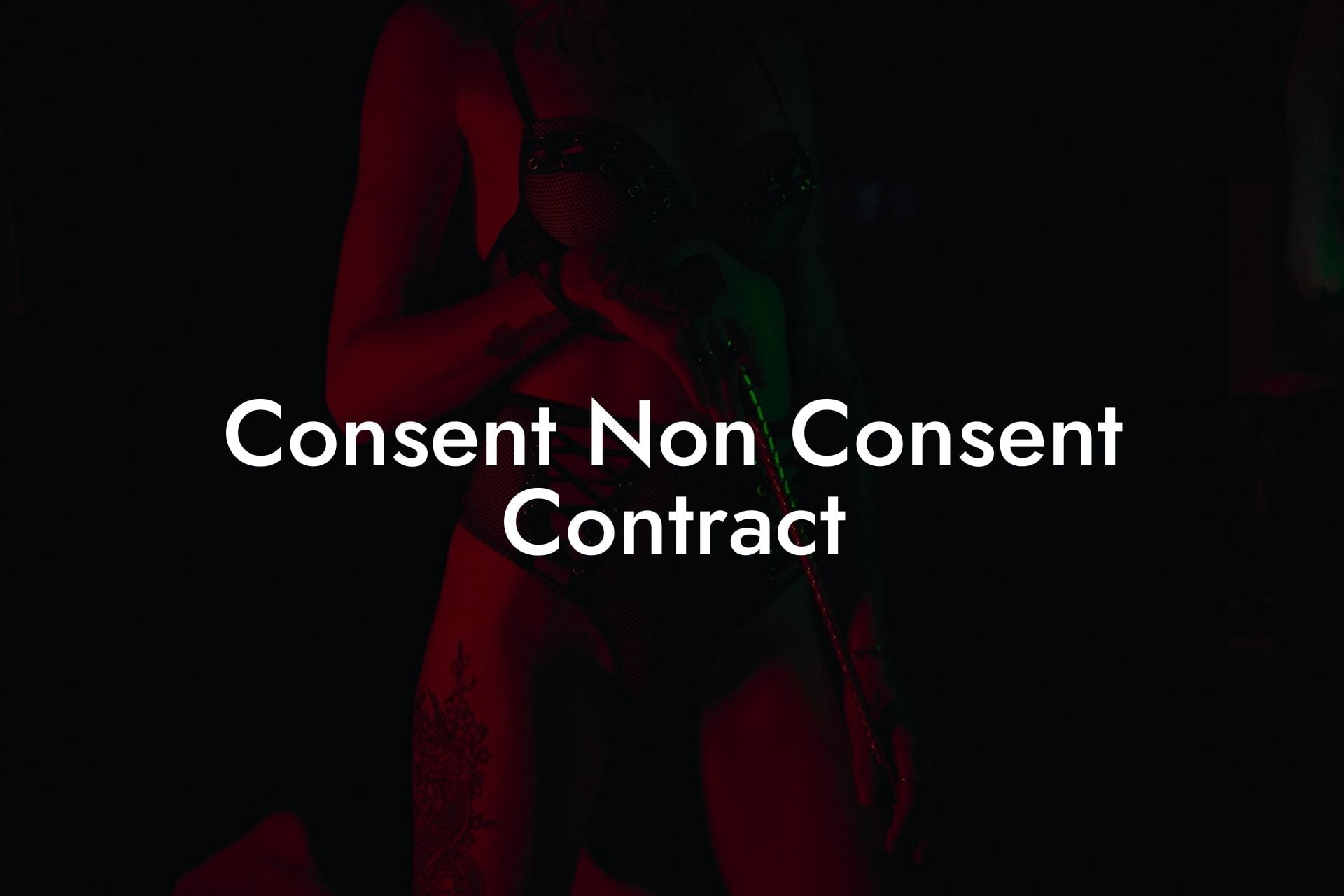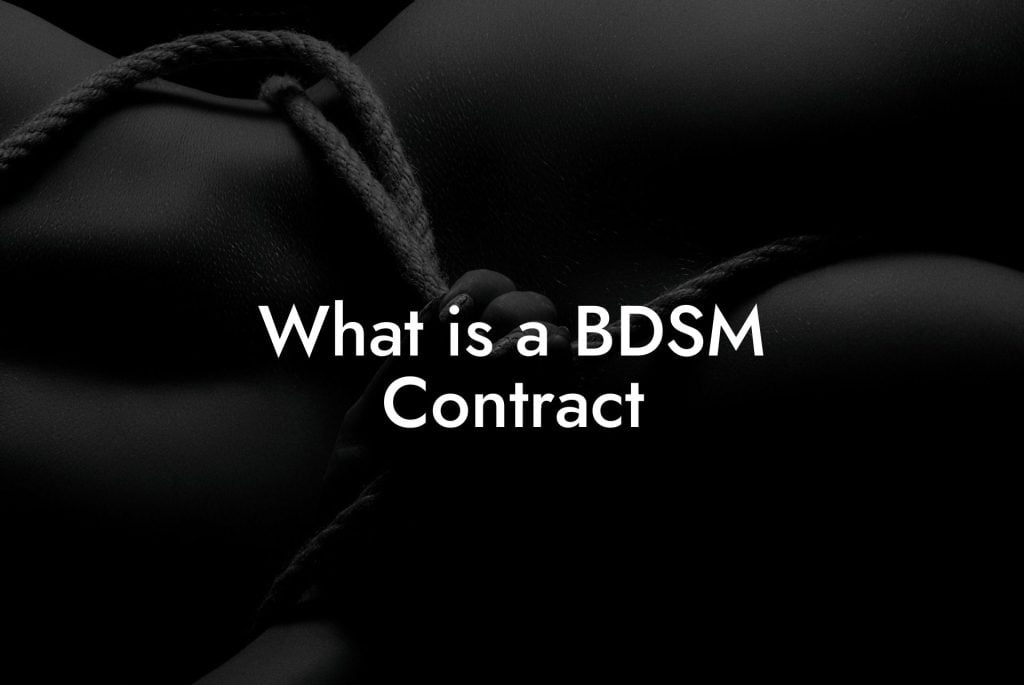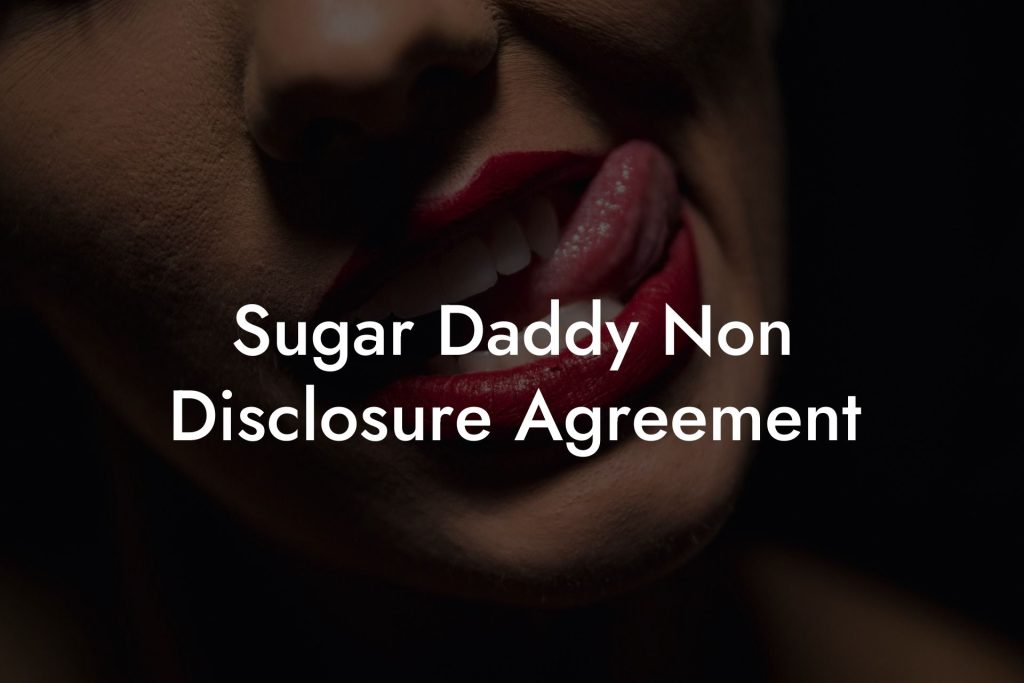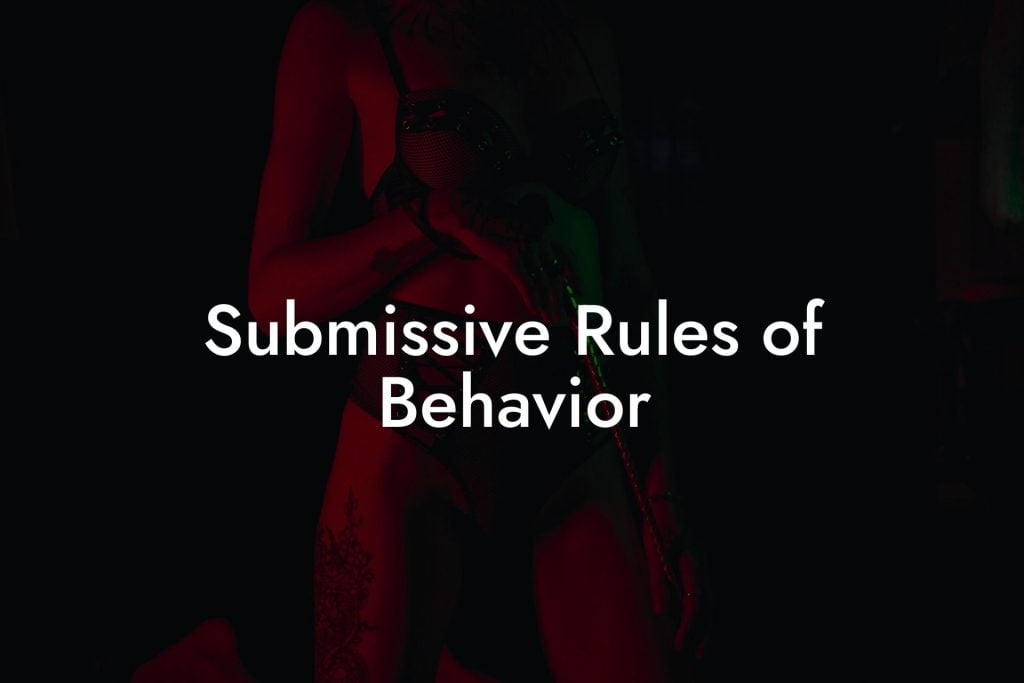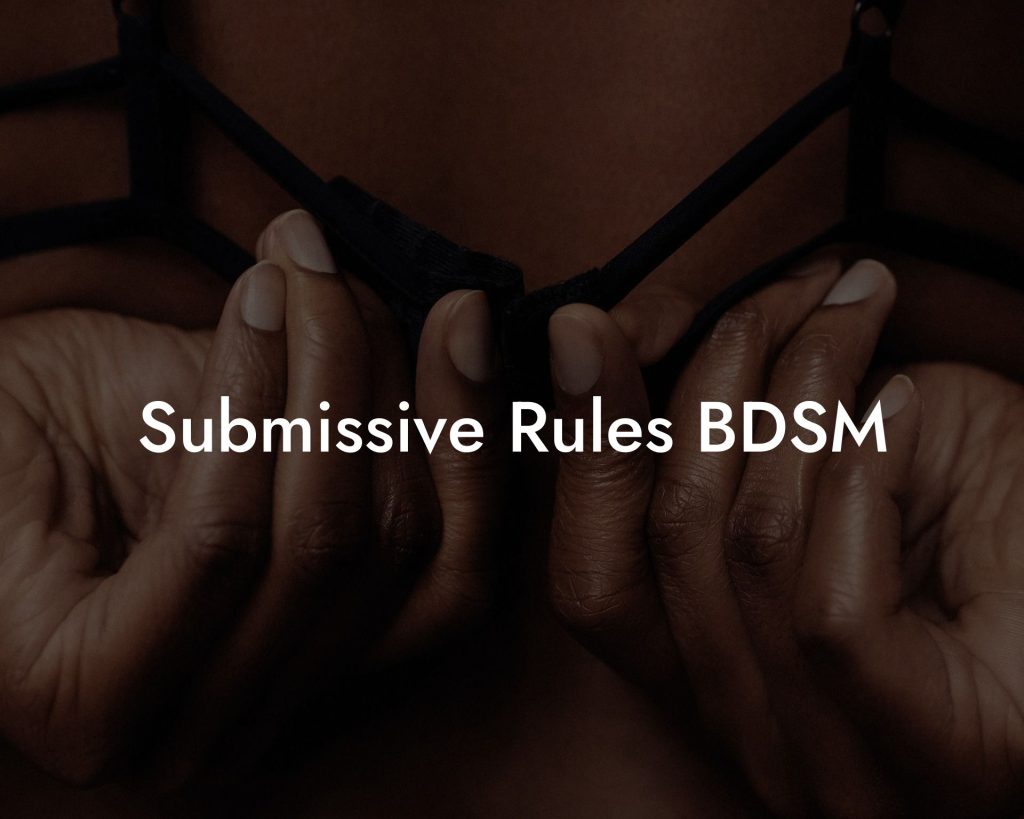Consent Non Consent is an electrifying aspect of BDSM that involves explicit agreement and boundaries set by both partners. The idea of engaging in intense roleplay where one partner relinquishes control to the other, while maintaining a hard limit on activities that can be carried out, can be both thrilling and arousing. In this guide, we explore the concept of Consent Non Consent, why it is important in BDSM relationships, and how it can be incorporated safely for an unforgettable experience.
In any BDSM relationship, consent is the cornerstone of trust and respect. It’s more than just saying “yes” or “no”—it’s about openly communicating your desires, limits, and expectations. But trust doesn’t end with a conversation—it’s built through ongoing, clear agreements. That’s where our Dominant & Submissive BDSM Contract Pack comes in. Find out more →
Consent Non Consent in BDSM Relationships
Consent Non Consent, also known as CNC or Rape Play, is a play dynamic in which one partner takes on the dominant role and the other partner willingly consents to be "taken" or "forced" in a roleplay scenario. It is crucial to establish explicit and enthusiastic consent beforehand to ensure the psychological, emotional, and physical well-being of each participant.
Communication and Trust
Open and honest communication is the foundation of any healthy BDSM relationship, particularly in Consent Non Consent scenes. Prior to engaging in any activities, both partners should have a detailed discussion about their boundaries, desires, and safe words. This dialogue creates a safe space for exploration and allows each partner to express their limits.
Setting Clear Boundaries
Establishing boundaries is crucial in Consent Non Consent scenarios. Both partners must have a thorough understanding of each other's limits and hard boundaries. This includes activities, language, and behaviors that are off-limits. A comprehensive BDSM contract can be an effective tool to ensure all parties are on the same page.
Safe Words and Signals
In Consent Non Consent play, safe words and signals are essential to maintain the well-being of all participants. Safe words should be agreed upon and easily recognized to indicate the need for immediate cessation of activities. It is crucial to establish a system that allows the submissive partner to communicate their limits, especially in situations where speech may be restricted.
Looking for the best BDSM & Kink OnlyFans content creators? Here is a list of of our favourites that you will love:
-
- Best BDSM & Fetish OnlyFans - Molly✨ >> Link
- Best BBW & Huge Ass OnlyFans - Naughty Hanna Zimmer 💜🎀 >> Link
- Best Sexy Gaming Nerd OnlyFans - 🎮 Gracy EstuSWEET 🎮 >> Link
- Best Fetish & Kink Messaging OnlyFans - 💫Lola La Fleur 💫 >> Link
- Best Girl Next Door OnlyFans - ☀️Lily ⛅ >> Link
- Best Tiny European OnlyFans - 💝 Ami Allison 💝 >> Link
- Best Cosplay OnlyFans - 🐱 Little Kitty Kate 👉👌 >> Link
- Best Little OnlyFans - 🧸 Katya 🙇♀️ Sun >> Link
- Best Sub OnlyFans - 🍌Hanna Banana🍌 >> Link
- Best Teen & Huge Tits OnlyFans - ❣️Anny❣️19 y.o. BUSTY student girl >> Link
- Best Tiny Tits OnlyFans - ⍣⭐️ Sofia Parker ⭐️⍣ >> Link
- Best Sub & Huge Boobs OnlyFans - Nika Huge Boobs >> Link
- Best Kink OnlyFans - Sofia💖 >> Link
- Best Fetish & Girl Next Door OnlyFans - Hillary is Wet 💦 >> Link
- Best Dirty Latina OnlyFans - Paula Flores 😈 >> Link
Not quite what you are looking for? View the full list →
Frequently Asked Questions
What is a BDSM contract?
A BDSM contract is a written agreement between individuals involved in BDSM activities that outlines the expectations, boundaries, limits, roles, and responsibilities of each party. It is a tool used to ensure that all participants have a common understanding and consent to the practices involved in their BDSM relationship or scene.
How important is consent in a BDSM dynamic?
Consent is absolutely essential in a BDSM dynamic. It ensures that all activities are agreed upon by every party involved and provides a framework for trust and safety. Consent must be informed, enthusiastic, and can be revoked at any time by any participant.
Why are trust and safety so important in BDSM?
Trust and safety are the cornerstones of any BDSM interaction. The activities often involve physical and emotional risks, and a high level of trust is necessary to ensure that all parties feel comfortable and secure. Safety practices, including safe words and aftercare, are fundamental to prevent harm and foster a positive experience.
What are some ways to establish trust in a BDSM relationship?
Trust in a BDSM relationship can be established through open and honest communication, taking the time to get to know each other's limits and boundaries, respecting those limits at all times, and consistently demonstrating reliability and responsibility in one's actions.
Is a BDSM contract legally binding?
No, BDSM contracts are not legally binding documents. They are symbolic agreements meant to outline the dynamics of the relationship and are not enforceable by law. Their primary function is to foster understanding and agreement between the parties involved.
How detailed should a BDSM contract be?
A BDSM contract should be as detailed as necessary to clearly convey the agreements, boundaries, and expectations of the parties involved. It may include specifics about activities, safe words, limits, duration, and any other aspects crucial to the participants' interaction.
Can BDSM contracts be modified?
Yes, BDSM contracts can and should be modified as the relationship or dynamic evolves. It's important for all parties involved to regularly review and discuss the contract, making adjustments as needed based on consent and comfort levels.
How do you introduce a BDSM contract into the relationship?
You can introduce a BDSM contract into the relationship by discussing the idea with your partner in a non-threatening environment, ensuring mutual interest and willingness to engage in this kind of agreement. Open and honest dialogue about desires, expectations, and concerns will help frame the contract's creation.
What happens if someone breaks a rule stated in a BDSM contract?
If someone breaks a rule in a BDSM contract, it should be addressed as soon as possible through communication. The incident should be discussed to understand why it occurred and to determine appropriate steps to prevent future breaches, which may include modifying the contract or pausing play.
Should a BDSM contract address what happens after a scene?
Yes, a BDSM contract should address aftercare, or what happens post-scene, to ensure that the physical and emotional well-being of all participants is considered and cared for. This can include specific actions such as cuddling, debriefing, or providing any needed comfort or assistance.
What are some common misconceptions about BDSM contracts?
Common misconceptions about BDSM contracts include the belief that they are legally enforceable, that they remove the need for ongoing consent, or that they're indicative of abusive dynamics. In reality, they are tools for consensual, safe, and informed BDSM play.
What are safe words and why are they important?
Safe words are pre-agreed-upon signals used to communicate the need to slow down, adjust, or stop the BDSM activity. They are important as they provide a clear, unambiguous way to ensure consent and safety during a scene.
How can beginners ensure their BDSM experiences are safe?
Beginners can ensure their BDSM experiences are safe by thoroughly researching and educating themselves on practices, fully discussing boundaries and safe words, engaging in activities with trusted partners, and starting with less intense activities to gain confidence and understanding.
What role does negotiation play in BDSM interactions?
Negotiation plays a critical role in BDSM interactions as it is the process where all involved parties discuss and agree upon the activities, boundaries, limits, and expectations before engaging in any BDSM play. It helps to ensure that everyone's needs and concerns are addressed.
Is it possible to have a BDSM relationship without a contract?
Yes, it is possible to have a BDSM relationship without a contract. Many people engage in these dynamics based on verbal agreements and ongoing communication. A contract is just one of many tools that can be used to facilitate understanding and agreement.
Can one engage in BDSM practices without having a dominant/submissive dynamic?
BDSM is a broad spectrum of practices and not all require a dominant/submissive dynamic. Individuals can engage in BDSM activities that explore bondage, sensation play, role-playing, and more without adhering to specific roles.
How often should a BDSM contract be reviewed?
A BDSM contract should be reviewed regularly depending on the frequency of interaction and the evolution of the relationship. Some may review their contract monthly, while others might do so after each scene or annually. The key is that it meets the ongoing needs and consents of the parties involved.
How can someone withdraw their consent during a BDSM scene?
Consent can be withdrawn at any time during a BDSM scene by using safe words or signals that have been previously agreed upon. All participants should be aware and respectful of these signals and cease all activity immediately if consent is withdrawn.
What is "aftercare" and why is it important?
"Aftercare" refers to the practice of attending to one another’s physical, emotional, and mental needs after a BDSM scene. It's important because it helps partners to reconnect, recover and ensure the well-being of all involved, preventing negative after-effects such as sub-drop or drop.
Can someone change their boundaries during a BDSM relationship?
Boundaries in a BDSM relationship are not static and can change over time. It is vital to communicate any changes in boundaries or limits to all involved parties and to update agreements like a BDSM contract to reflect these changes.
What is the best way to resolve conflicts that arise within a BDSM dynamic?
The best way to resolve conflicts within a BDSM dynamic is through open, honest, and non-confrontational communication. Discussing the issue calmly, listening to each other, and trying to understand the other's perspective can lead to solutions that respect everyone's needs and boundaries.
As you dive into the thrilling world of Consent Non Consent, remember the importance of open communication, trust, and clear boundaries. Explore our Ultimate BDSM Contract Pack to create a personalized agreement that ensures both partners feel secure and respected. Continue your journey with Filthy Adult, your trusted resource for educational guides, stimulating blog content, and a diverse range of BDSM products. Share this article with your friends and partners to spread awareness about the enriching potential of Consent Non Consent.

